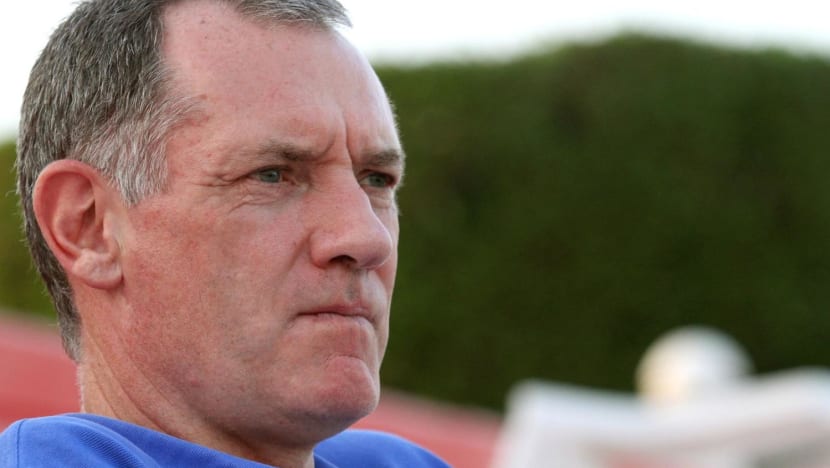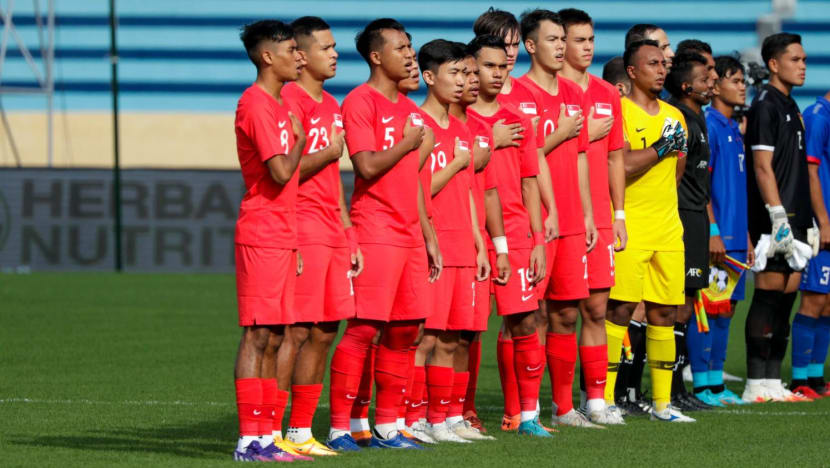‘Significant improvement is possible’: New FAS technical director stresses need for collaborative approach

File photo of Michael Browne. (Photo: Wikimedia Commons/Doha Stadium Plus)
SINGAPORE: New Football Association of Singapore (FAS) technical director Michael Browne has stressed that he will adopt a collaborative approach during his tenure to improve local football.
Browne was announced as FAS’ new technical director in a news release on Friday (July 1). He is currently finalising his travel arrangements to come to Singapore and will officially assume the role this month, said FAS.
The Englishman is a UEFA Pro Licence holder and a former academy director of current English third-tier side Charlton Athletic. He also spent 10 years in Qatar, working as head coach of the country’s Aspire Academy, and was involved in a number of different roles there, including being head of national team scouting.
In an interview with CNA over Zoom, Browne said one of his key priorities would be to work closely with local coaches.
“For me, the most important thing is to meet as many coaches and people involved in football as possible, as quickly as possible. If you're a foreign coach going into any country, I think it's a mistake to go in with preconceived ideas about what you're going to change and what you're going to implement,” he explained.
“Because every country is unique. Every country has strengths and weaknesses in terms of how they develop players and how they operate. And for me, the most important thing is to try and identify strengths, look at the weaknesses and see how we can rectify the weaknesses, but also build on the strengths.”
And rather than coming in and telling people what to do, the Englishman said that he sees his role as one that facilitates improvement.
“There’s certain areas that we need to definitely try and make progress in, in terms of participation rates at grassroots, how are the potentially elite young players taken care of, what's the provision for them in terms of training, games, programmes, et cetera,” he said.
“So all these areas are areas that I'm keen to pursue, but … I need to sort of evaluate first and just get a better understanding. Obviously, I have ideas as to what I think might need rectifying, but until you get there, then I think it's better just to reserve judgment.”
Browne was also Indian I-League club Punjab FC's technical director from March 2019 to July 2020. Before that, he was Northern New South Wales Football Australia’s state technical director.
His appointment comes about seven months after FAS announced that then technical director Joseph Palatsides would leave due to "health and personal reasons" brought about by the COVID-19 pandemic.
Palatsides was appointed in May 2019 to oversee the development of football in Singapore and in June 2021, he signed an agreement to extend his contract until 2023. However, he left before his contract expired.
Before Browne's arrival, former Young Lions head coach Philippe Aw was acting as the interim technical director.
"SIGNIFICANT IMPROVEMENT IS POSSIBLE"
Having spent a decade in Qatar, Browne observed similarities between the Middle Eastern nation and Singapore.
Similar to Singapore, Qatar has a small population and does not have many players who are eligible to play for the country, noted Browne. More importantly, both countries have the motivation to improve their standing when it comes to football, he added.
“They obviously had ambitions to do a lot better and similarly so does Singapore. If you're going to improve football in the country, you need enough people with the right motivation to make it happen. And I believe from having spoken to several people in Singapore, I think that does exist,” said Browne.
“It’s not gonna be a simple journey by any means. But as long as you get enough people on board and everybody moving in the same direction, I think significant improvement is possible.”
He also acknowledged that results would suggest that the other countries in the region have moved ahead of Singapore.
Critics of the FAS' last two technical directors - Palatsides and Belgian Michel Sablon - have questioned their impact on local football.
When asked if he was aware of the background, Browne said that he had "looked at" a few of the previous technical directors such as Sablon and read reports about the standards of players as well as some poor results from Singapore’s national age group teams.
“It’s clear that things possibly haven't gone the way that people would have liked in recent years, but there's obviously reasons for that," said Browne.
"It's not necessarily the case that you put a TD (technical director) in and it doesn't go well, it’s the fault of that TD. Quite possibly that the structures in place in the country are inadequate to enable improvement."

Referencing the “Unleash the Roar” project - a national plan to grow local football - Browne noted that this showed that stakeholders want to make “tangible improvement”.
He added: “I sort of see my role as making sure that's implemented effectively and efficiently. As I mentioned previously, you can put it on paper and it looks good, but the reality is, it has to work and it has to work at the right level. Otherwise, you're not going to initiate improvement.”
One of the reasons Browne was drawn to the job was because he felt he could “make a difference”.
“It’s obvious that people are motivated to want to improve, which for me is important because you can go and work in places where people just want to plod along and things never get better. But I think Singapore wants to improve. I think that there's people there that have the motivation to want to improve and for me, I'm very pleased to be a part of that and hopefully to play a significant role in that improvement,” he said.
He added that the opportunity to work in Singapore was “appealing”.
“While I was in Qatar, I was very fortunate (that) I was able to travel to a lot of different countries for football-related matters … Having that experience opens your eyes and it gives you a taste of what life is like in other countries,” explained Browne, who had been to Singapore twice.
“So it's something that has always appealed to me, and the opportunity to work in a country such as Singapore is appealing. Singapore has got a fantastic reputation as a good country to live in lots of different aspects.”
IMPROVING THE LEVEL OF PLAYERS
The end goal, said Browne, will be to produce players which improve the calibre of the national team.
His long-term vision for Singapore football is for the country to produce players who are capable of getting the national team eventually to a level where they are a “real player” at the Southeast Asian level and have a “real chance” of qualifying for a World Cup.
“Ultimately, if the players aren't improving, then things aren't going to plan. So, my ... definite aim or ambition would be to ensure that the country is in a position whereby the level of players that are being produced are enabling the senior teams to perform better,” said Browne.
He noted how the lowest-ranked team to have qualified for the World Cup was North Korea at 105th.
“If Singapore is to qualify for a World Cup, then ideally, both men and women, you need the ranking to improve. And how does the ranking improve? The ranking improves by getting results and how do you get results? You get results by hopefully producing players that are going to improve the team,” he added.
Singapore’s men’s football team are currently ranked 159th in the world, while the women’s football team are 132nd.
“Every country will produce national team players. So regardless of who works in Singapore, Singapore will produce national team players. That's not enough because what you need to do is that you need to produce players that are going to help the national team improve the level. And that's the hard part,” said Browne.
“Unless the national team is improving, then all you're going to do is perpetuate the current situation, which is you know, you're going to be floating along in 140, 150 for the men's ranking, and it needs to improve.
"So, for me definitely the priority is to try and ensure that the national team coaches have a better pool of better quality players that will help them achieve those results.”


















